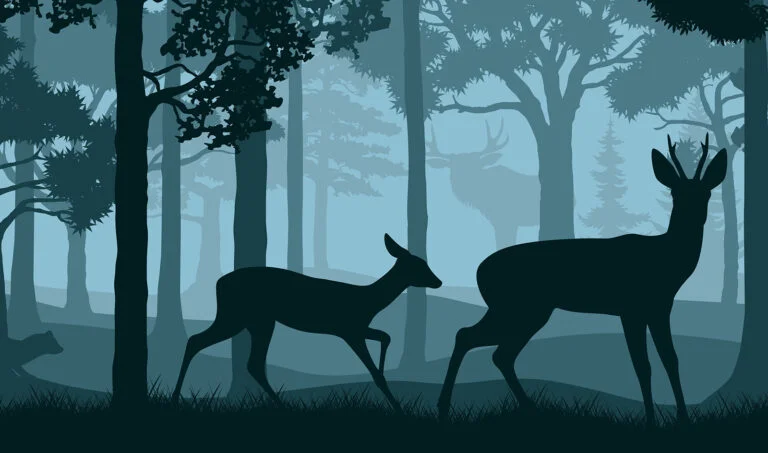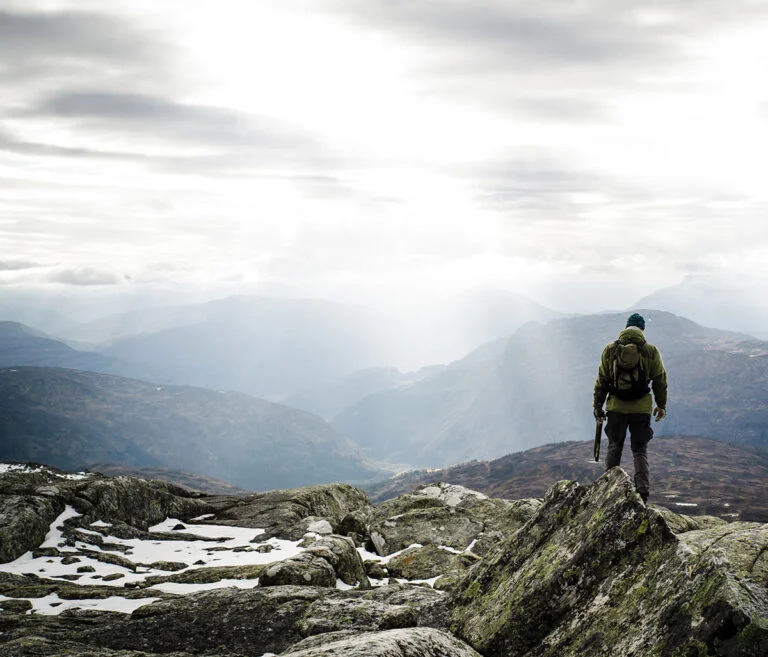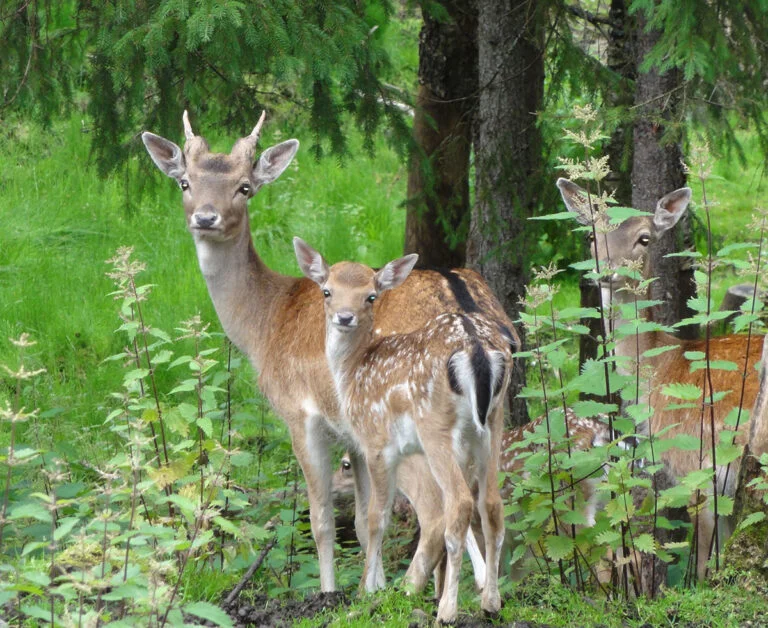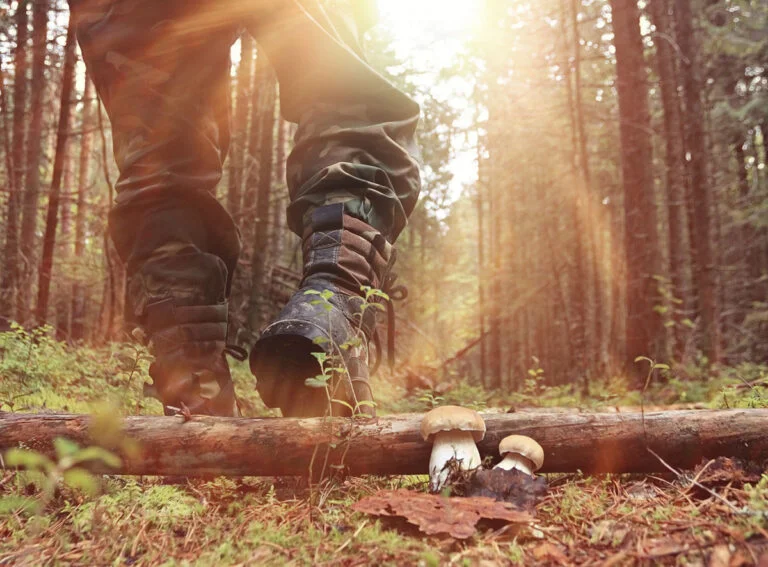Norway has a strong tradition of hunting. The country’s wild expanses are the perfect setting to perform this age-old activity, and hunting lines up very well with the ethos of outdoors-loving Norwegians.
Whether you are a hunter yourself, or just want to learn more about Norwegians’ interest for the activity, read on as we give you the essential facts about hunting in Norway.

We’ll even tell you everything you need to know if you would like to go on a hunting trip to Norway.
Norway’s strong hunting tradition
Norway is the fourth country in the world in terms of number of hunters per capita – behind Canada, Finland and Cyprus. This can be explained by two factors.
First, Norwegians have easy access to the wilderness. No matter where you are in the country, you’re never really that far from the wild.
Second, the harsh winter conditions and the short, cool summers, mean that hunting was historically not a hobby, but a nutritional necessity. In a bad farming year, a successful winter hunt could mean the difference between survival and starvation.
Number of hunters in Norway
The total number of hunters in Norway has been largely stable for the past two decades, hovering around 140 000 active hunters every year.

Since the population of the country is steadily increasing, this means that hunting, per capita, is on a slight decline.
What animals are hunted in Norway?
Here are the most common animals hunted by Norwegians and visitors to Norway.
Moose (elg)
The biggest animal being hunted in Norway is the moose – affectionately referred to by Norwegians as the king of the forest.
Read more: Moose Safety in Norway
Since the 1980s, the number of moose hunted in Norway has varied between 25 000 and 40 000 – mostly hovering close to 30 000 (the figure for the 2021-2022 season is 29 276 moose felled).
Red deer (hjort)
These past few years red deer have quickly overtaken the moose as the number one target for big game hunters. From about 10 000 red deer felled yearly in the 1980s, the figure gradually rose to about 30 000 by the end of the 2000s and over 50 000 by the start of the 2020s.
This increase is largely due to the explosive increase in the red deer population. The reasons for this increase are not simple, but the absence of natural predators and an increase in agricultural yields are part of the answer.
In short, numerous fertilised agricultural fields mean red deer just have more to eat. Well-tended private gardens are also a handy source of food for red deer.
Roe deer (rådyr)
The red deer’s smaller relative, the roe deer, is another prized prey for Norwegian hunters. Upwards of 34 000 were hunted during the 2020-2021 season.

Given their small size, these deer have a larger number of predators, which probably explains why their total numbers are lower than that of the red deer. Foxes, wolverines, lynxes and even golden eagles have been known to hunt them (although only the calves, in the case of the latter).
Wild reindeer (villrein)
Most reindeer in Norway are domesticated herds owned by the country’s indigenous (Sami) population. But there are still wild herds, and they are being hunted.
The number of animals hunted yearly is subject to quotas determined by the authorities, based on the state of the wild reindeer population. That number has been under 10 000 every year since the 1980s, and for the 2021-2022 season it was at 5641.
Small game
Many other types of small game (mostly birds but also a few mammals) are hunted in Norway. The table below shows the numbers hunted during the 2020-2021 season.
| Willow grouse (lirype) | 126 800 |
| Ptarmigan (fjellrype) | 49 700 |
| Wood grouse (storfulg) | 9 490 |
| Black grouse (orrfugl) | 18 180 |
| Common wood pigeon (ringdue) | 33 660 |
| Mallard (stokkand) | 9 890 |
| Hare (hare) | 14 730 |
| Red fox (rødrev) | 21 720 |
Rules for hunting in Norway
Every hunter in Norway must be registered in the Norwegian Register of Hunters and pay the hunting licence fee. The fee for a hunting licence including all types of game is 460 NOK (about 54 USD).
Hunters must also either complete the Norwegian hunting licence test, or, in the case of foreign hunters, provide documentation showing that they are qualified for the equivalent type of hunting in their homeland. The age limit is 16 for small game and 18 for big game.

For shooting big game with a rifle, hunters must either pass the Norwegian shooting test or provide documentation that they have passed such a test in their home country. These documents must be brought along during the hunt itself.
Lastly, hunters must secure permission from the person owning the land on which they will hunt. A summary of the rules for foreign hunters in Norway can be found on the website for the Brønnøysund Register Centre.
Norwegian firearms regulations
Norway has strict gun ownership laws, which allow gun ownership (in the majority of cases) for hunting or sports shooting.
Weapons storage regulations specify that every firearm, or a vital part of it, must be securely locked away in an approved gun safe, securely bolted to a non-removable part of the house.
Despite these regulations, gun ownership is quite common in Norway, at about 29 firearms per 100 inhabitants. This is well under the US (120) and Canada (35) but above the United Kingdom (5), Ireland (7), Australia (15) and New Zealand (26).
Bringing a firearm to Norway
The rules for bringing a firearm to Norway are different depending on whether or not you are a European resident.
For Europeans
If you reside in Europe, and have a valid European Firearms Pass received from the authorities in your country of residence, you can go through the “green zone” (nothing to declare) at the Norwegian customs, and do not need to present your firearm to an official upon arrival.

You must, however, be able to present both the firearm and firearms pass on request. This rule applies when staying in Norway for up to three months.
For non-Europeans
If you are from outside Europe, you must obtain a licence from the Norwegian police to temporarily import your firearm. The application form must be sent to the police district where you will be staying – no later than two months prior to your arrival.
When entering Norway, you will have to go through the “red zone” (something to declare) and show both your licence and firearm to a customs official. An additional requirement for non-Europeans is to show both the licence and the firearm to customs officials upon leaving Norway.
For everyone
As a foreigner bringing a firearm into Norway, you are required to carry with you at all times:
- Valid firearms licence from your country of residence
- Valid proof of identity
- Documentation verifying why you are travelling to Norway with a firearm, such as an invitation to take part in a competition or documentation that you have access to hunting grounds in Norway
- If you reside in Europe: A valid European Firearms Pass. All firearms that you are bringing with you must be listed on the pass
- If you reside outside of Europe: your licence for temporarily importing your firearm
The easy way to go hunt in Norway
The easiest (but not the cheapest) way to deal with the red tape and logistics associated with hunting in Norway as a foreigner is to deal with a tour operator. You will still have to respect the laws and regulations, of course, but the tour operator will guide you through the process.
Proceeding in this manner removes the hinder of securing permission for the hunt from the landowner (since your guide will have taken care of that). It also adds nice bonuses like the possibility to hunt with a dog or to combine the hunt with a sailing trip.
Are you a hunter? What is your favourite hunting destination? Would you like to try hunting in Norway? Let us know in the comments!


Hi, how do I get a hunting permit from a landowner in Norway and where can I find such a list of such landowners? I am looking for a way to find a suitable hunting ground and how to request/buy a permit. (I have already visited https://www.brreg.no/en/the-register-of-hunters/foreign-hunters/?nocache=1662639125817)Now just get “have permission from the landowner”
As the article suggests, try contacting tour operators. Failing that, maybe try local hunting clubs for guidance.
Where is my past comment?
It was in the queue to be approved. Chill out.
Would like to hunt in Norway as a job. Was a professional hunter in South Africa. Hunted mainly with Europeans.
This seems like it may be better and cheaper than an Alaskan Moose / Caribou hunt. I am from a Norwegian family in Wisconsin, USA, and it has been my dream to visit family there. Thank you for the information.